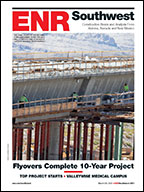The State Road and Tollway Authority (SRTA) plans to issue $822 million in Federal Highway Grant Anticipation Revenue Bonds later this year, but opponents intervened when a petition was filed Aug. 6 with the state court to validate the issue. They argue that the Georgia constitution expressly prohibits certain types of debt which, in this case, allow federal highway revenue received by the Georgia Dept. of Transportation to be used by the road and tollway authority to guarantee its bonds. "A state agency cannot guarantee the debt of an authority," says Mike Bowers, attorney for the opponents, and a former Georgia attorney general.
The state constitution was changed in 1972 to allow the state to directly incur public debt. The amendment also discontinued the practice of incurring indirect debt through agencies that would issue bonds and guarantee them with state lease payments. "They stopped exactly what they are doing now," says Bowers. He speculates that the method is being used to avoid a political fight over projects to be funded by bond sales.
By following Georgia law, the bonds would have to be approved by the entire general assembly, Bowers says. "This is the biggest bond issue in the history of the state and it was approved by only five elected officials," he says. Current state Attorney General Thurbert Baker argued in a brief filed Aug. 28 that the joint resolution directing all federal highway funds to SRTA instead of to the state DOT is neither a contract nor binding, and thus not unconstitutional.
BACKING. SRTA's bond resolution says monies will be backed by the federal highway funds. A source in the attorney general's office says since the joint resolution is not binding, bonds should be paid with federal funds. But they will actually be repaid only by SRTA's revenue stream, including existing tolls. "Bonds may have a lower rating because of that," he says.
Opponents say without the security of the federal funds, bonds will drop to junk status. "The state can't have it both ways. It's either binding or it's not, and if it's not, then what appears to be secure isn't," says Joshua Archer, opponents' attorney. "The bonds won't be worth the paper they are written on." Standard and Poor's, like ENR a unit of the McGraw-Hill Cos., has not yet rated the bonds, but the issue of security will clearly be considered in the credit rating, says Kurt Forsgren, an S&P director. "Promises don't provide a level of comfort and security," he says.
The group opposing the bonds is also fighting the Northern Arc, a proposed 59-mile road north of Atlanta favored by some to relieve Atlanta's traffic problems. The bonds at issue would not fund the highway, but opponents fear the same method could be used. "We want to make sure no precedent is set for such a manipulative funding scheme that does not allow the people to have a say,'' says Bob Charles, vice president of the Northern Arc Task Force. "If they get the general assembly's vote then we're fine with it."
eorgia's attorney general says the state's attempt to issue bonds secured by federal highway funds does not violate the state constitution, as opponents say.

Post a comment to this article
Report Abusive Comment